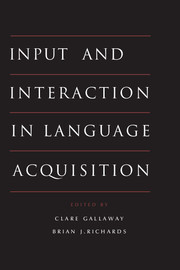Book contents
- Frontmatter
- Contents
- List of figures
- List of tables
- List of contributors
- Preface
- Introduction
- Part I General issues
- Part II Specific aspects of input and interaction
- 5 The rest of the family: the role of fathers and siblings in early language development
- 6 Phonetic and prosodic aspects of Baby Talk
- 7 Language learning at home and school
- Part III Types of language learner
- Conclusion
- References
- Author index
- Subject index
5 - The rest of the family: the role of fathers and siblings in early language development
Published online by Cambridge University Press: 05 June 2012
- Frontmatter
- Contents
- List of figures
- List of tables
- List of contributors
- Preface
- Introduction
- Part I General issues
- Part II Specific aspects of input and interaction
- 5 The rest of the family: the role of fathers and siblings in early language development
- 6 Phonetic and prosodic aspects of Baby Talk
- 7 Language learning at home and school
- Part III Types of language learner
- Conclusion
- References
- Author index
- Subject index
Summary
Introduction
At one time there was a simple picture of the role of the linguistic environment in child language acquisition. The classic motherese hypothesis – as embodied, for example, in many of the papers in the inaugural Snow and Ferguson (1977) volume – went something like this. Just as children cannot learn to ride a bicycle by simply being given one, they cannot learn to speak a language by simply being exposed to one. In both cases adults must provide some training wheels. In the case of language this means addressing children directly, in a high pitch, with child-friendly utterances – morphologically and semantically simple words put together into short and simple sentences – that are tuned in to the child's current focus of attention or conversational topic. In general, empirical research with Western middle-class mothers has confirmed that how well adults do these things is reliably associated with such outcomes as children's early vocabulary size and mean length of utterance (MLU); and there are even some experimental results that suggest a causal role for motherese (see Bohannon and Warren-Leubecker 1988 for an overall review).
The complications with this hypothesis that have emerged in recent years are twofold. First, mothers in some other cultures do not interact with their children in the same way that Western middle-class mothers do.
- Type
- Chapter
- Information
- Input and Interaction in Language Acquisition , pp. 109 - 134Publisher: Cambridge University PressPrint publication year: 1994
- 40
- Cited by



